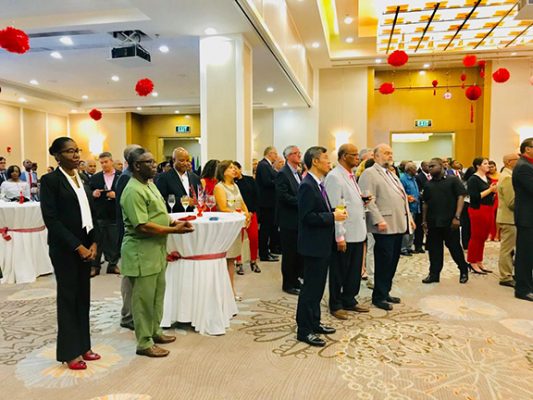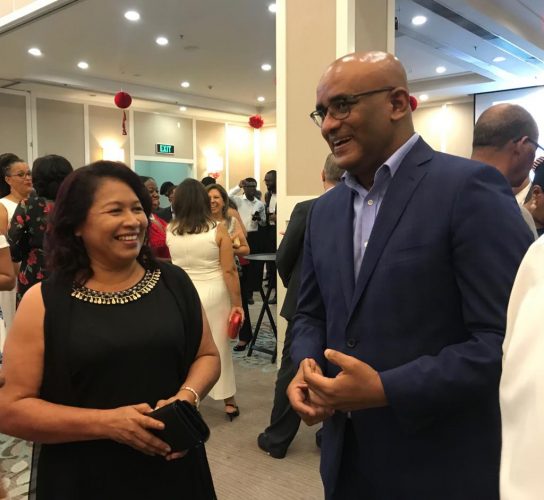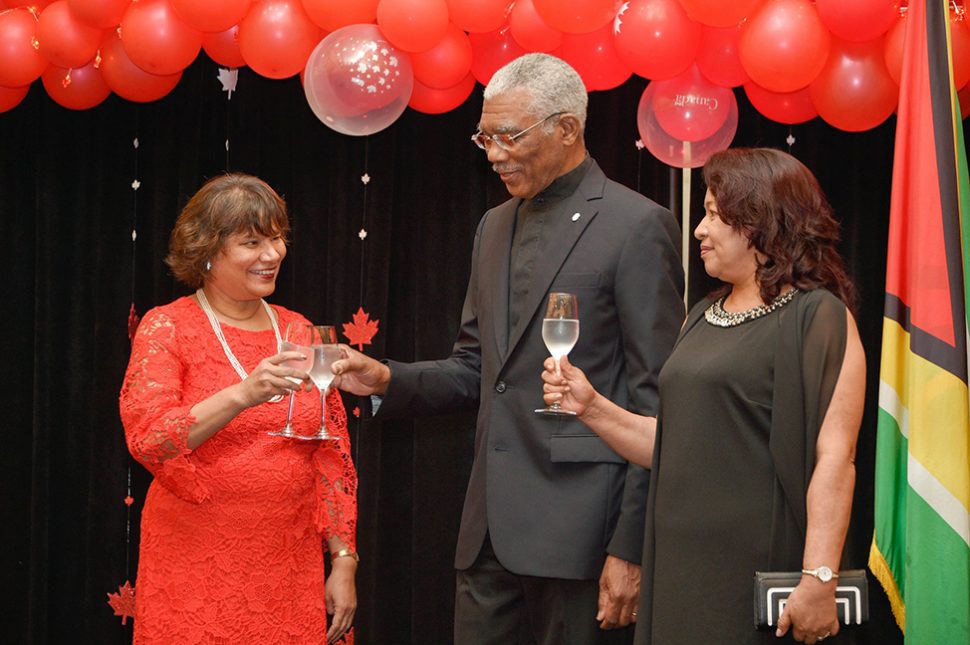A Canadian Chamber of Commerce will soon be launched in Guyana.
This was disclosed last evening by Canadian High Commissioner to Guyana, Lilian Chatterjee at the 152nd anniversary of Canada Day at the Marriott Hotel in Kingston.
In her address Chatterjee said that the establishment of the chamber of commerce is a reflection of the growing Canadian business presence here.
She also disclosed that the Canadian Audit and Accountability Foundation, the Auditor General of British Columbia and the Audit Office in Guyana on Sunday signed a seven-year MOU, focusing on in-country training and fellowships in Canada and working with parliamentarians so that all are better equipped in performance audits to hold the government to account.

Her wide-ranging address touched on democracy and will be seen as containing oblique references to the political situation here. The High Commissioner referred to her Foreign Minister Chrystia Freeland’s citing of Robert Kagan’s book `The Jungle Grows Back’ and his contention that “if the Liberal order is like a garden, artificial and forever threatened by the forces of nature, preserving it requires a persistent unending struggle against the vines and weeds that are constantly working to undermine it from within and overwhelm it from without. And today, there are signs that the jungle is growing back.”
Freeland went on to say that “our first obligation is to ensure that our domestic democratic gardens are flourishing. Around the world, we’re seeing a resurgence of…nationalists who build their popularity by stoking hatred of the other…When the jungle grows back, it is the weakest who are the first to suffer… as we cultivate our own plots in the 21st century, we must take care that we are growing gardens whose fruits are harvested by the many and not just the few. To do that, we need to address the legitimate concerns of our people even as we make the broader case for liberal democracy.”

Adverting to Canada’s upcoming elections, Chatterjee said that preparations are currently underway by an independent, non-partisan body, accountable to Parliament and not to government or any political parties.
“The independent body I am referring to is Elections Canada and its role is not to determine when elections will be held but to ensure that every eligible citizen has the right to vote in free and fair elections”, she said.
She added that recent Canadian history showed that the Conservative party went from back-to-back majority governments in the 1980s to just 2 seats in 1993.
“They accepted it as the will of the people. The Liberal government held power between 1993-2006 until they were defeated by the Conservatives in 2006 and in 2011, and were reduced to third party status. They accepted it as the will of the people. In 2015, the current Liberal government was elected in a majority government and the defeated parties accepted it as the will of the people.
“It is still too early to know who will form (the) Government in Canada’s next election. There will be a clash of policy ideas but there will be no clash of fists. When the election is decided, there may be tears but there will be no violence. I can guarantee you that whoever loses will accept it as the will of the people. Why? We are not better than you and we are certainly not perfect. Canada`s independence was forged by brokering among very distinct regions, ethnicities and religions. Consensus and compromise are hallmark Canadian values and the key to Canada’s success”, she declared.
Your partner
She added “We were here when you had no oil. We have accompanied you in all stages of your development when very few were here to support you. We are not your donor; we are your partner. And you can count on Canada to continue to partner with you as we cultivate our gardens of liberal democracy so that all of our citizens can flourish”.
Noting that Canada was Guyana’s largest trading partner, the High Commissioner said Canadians are increasingly investing in Guyana’s oil and gas sector. She said that three companies headquartered in Toronto will be drilling offshore: CGX, JHI and Eco Atlantic. Further, she said that there are 12 partnerships between Canadian and Guyanese companies in the oil and gas sector. She said that LearnCorp, specialising in technical oil and gas training is currently training 24 people from Guyana in Nova Scotia to work offshore on the Liza Destiny Floating, Production, Storage and Offloading platform. She said that according to the Centre for Local Business Development, over 60 companies from across Canada have registered with it. While Guyana Goldfields is known, she said that there are 10 Canadian mining companies in various stages of exploration and production.
Earlier on, she had adverted to many Guyanese who have made their homes in Canada. She added that while some might say that they contributed to the brain drain they sent to Guyana nearly US$208m over the past five years.
She quoted Canadian Prime Minister Justin Trudeau as stating that “Diversity is a fact but inclusion is a choice” and so that it was not enough to celebrate diversity; “we must actively make all races feel welcome and equal participants in decision-making and power-sharing. I have heard Guyanese use the expression `we time’ as a winner takes all proposition. I believe `We time’ means all of us; not just some of us”.
She told the gathering that last month she met the Canadian Immigration Minister, Ahmed Hussein. whose family fled the civil war in Somalia for a refugee camp in Kenya. He went to Canada at the age of 16 and eventually became an immigration lawyer and is now the Immigration Minister. She reported him as saying that nowhere else in the world but Canada could his story be possible.
She lauded the Government of Guyana for its acceptance of Venezuelan migrants.
“It speaks to your compassion to accept people escaping harsh conditions when that country’s government is in a territorial (controversy) with you. The Canadian High Commission was pleased to work with the Civil Defence Commission in providing food, water and shelter to Venezuelan indigenous migrants in Region 1”, she stated.
In his remarks, President David Granger said “Canada, today, has become a model of multiculturalism and a symbol of social cohesion. Canada’s unwavering commitment to the principles of gender equity, human rights and inclusionary democracy and its leadership on matters of critical importance to the international community have earned it international acclaim”.
He stated, according to the Ministry of the Presidency, that Canada remains a valued development partner and its investments in mining and oil and gas are energising economic development and generating employment and business opportunities for citizens and corporations.
He added that Canada has provided assistance in a wide range of fields including education, the environment and climate resilience, indigenous peoples’ development, governance, justice administration, public administration, private sector development, social development and support for the National Assembly.






